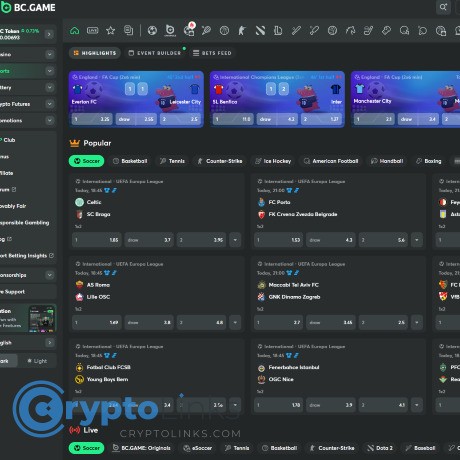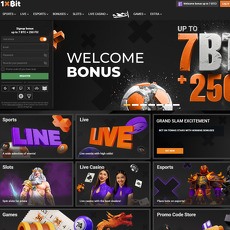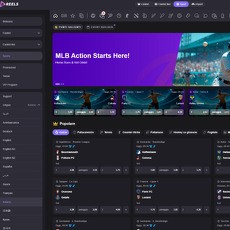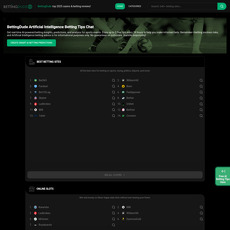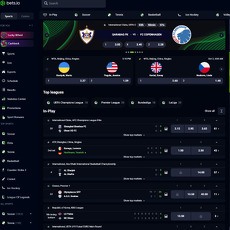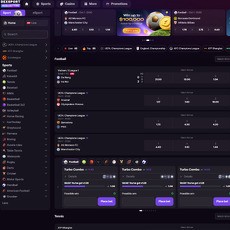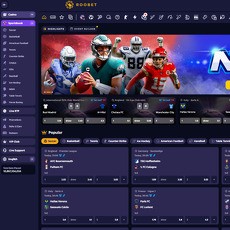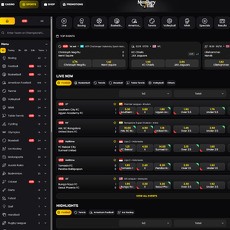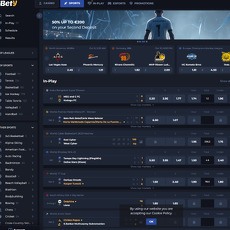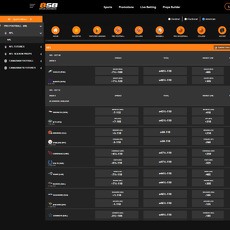BC.Game Review
BC.Game
bc.game
BC.Game Sportsbook & Online Casino: Ultimate Review Guide + FAQ (2025)
Thinking about trying BC.Game for sports betting or casino games, but want the real story before you deposit a single coin?
You’re in the right place. I’ve put this guide together to cut the noise and give you straight answers: what’s legit, what to watch for, how the sportsbook stacks up, what the casino does well, how payouts really behave, and what support looks like when things go sideways. I’ll also tackle the questions everyone is asking: is BC.Game closing down, how fast are withdrawals, can you use it in certain regions, and is there any “trick” that actually works.
Quick note: If you’ve read random forum threads that go in circles, this guide is designed to be the opposite—practical, current, and no fluff.
The common headaches players face with BC.Game (and crypto casinos in general)
Most frustrations I see aren’t unique to BC.Game—they’re common across crypto-first books and casinos. Here’s what typically causes headaches, plus what that looks like in real life:
- License confusion and regional bans: Folks assume global access. Then they travel, try to log in, and hit a geo-block. If they force it with a VPN, they risk their balance.
- Surprise KYC requests: Crypto sign-up feels anonymous, but larger withdrawals, flagged activity, or regional rules can trigger ID checks. If you’re not ready, payouts pause.
- Slow withdrawals during network spikes: Crypto is fast—until the chain gets busy. During mempool congestion (think big market moves), fees jump and confirmations slow.
- Unclear bonus terms: Wagering requirements, minimum odds, excluded games, and expiry times trip up many players. Miss one detail and your bonus (and wins from it) can vanish.
- Mixed player reviews: You’ll see glowing praise next to angry posts. Often the difference is simple: verified accounts with clean play glide; accounts with VPNs, multi-account flags, or unfinished wagering get reviewed and delayed.
- “Hack” claims: Algorithms, seeds, martingale clones—none beat math or house edge. These “systems” usually end with restricted accounts or drained bankrolls.
If you’ve ever tried to cash out right after a hot streak while a bonus is still active, you know how this goes. Or if you’ve sent USDT on the wrong chain (TRC20 vs ERC20), you’ve learned the hard way how unforgiving crypto can be.
What I promise in this review
- Availability and safety: Where BC.Game works, where it doesn’t, and what the license actually means for you.
- Payments and payouts: Supported coins, what “fast” payouts really look like, and why delays happen.
- Sportsbook depth and odds: How the lines compare, live betting experience, limits to watch.
- Casino quality: Slots, live tables, and the BC Originals that crypto purists love.
- Bonuses decoded: Rakeback, VIP, wagering rules, and how to avoid forfeits.
- Support and reputation: What to expect when you need help and how to get issues resolved quicker.
- Fast answers to big questions: Shutdown rumors, US access, and whether any “trick” actually works.
Who this guide is for
- Sports bettors comparing odds, live markets, and payout speed across crypto books.
- Casino players who care about provider variety, RTP, and provably fair originals like Crash and Plinko.
- Crypto-first users who want clean deposits, quick withdrawals, and clear rules—without nasty surprises.
- Travelers who need to know how geo-blocking and KYC affect access and payouts.
How I test (quick)
- Read the fine print: Licensing, terms, and bonus rules—especially limits, eligible games, and expiry.
- Transact with multiple coins: BTC, ETH, and stablecoins across different chains to check fees, speed, and errors.
- Measure odds vs. market: Compare pregame and live prices against sharp books to gauge competitiveness.
- Check wagering flows: Track how wagering updates, what counts, and where terms get confusing.
- Stress-test support: Open tickets with real issues (account flags, payment checks) and log response times and quality.
- Scan player complaints: Look at patterns on public boards and how quickly disputes are resolved with proper docs.
If you’ve ever wondered, “Is BC.Game actually allowed where I live—and what happens to my money if it isn’t?” you’ll want to keep reading. Next up, I’ll break down where BC.Game is available, what its license covers, and the latest on regional changes—including the closure headlines you may have seen. Ready for the straight answer?
Safety, licensing, and where BC.Game is available
Before you send a single satoshi, get clear on two things: who’s supervising the platform and where you’re legally allowed to play. That’s your baseline for risk. Everything else—games, odds, promos—comes after.
“In crypto gambling, the license sets the floor. Your own risk management sets the ceiling.”
BC.Game operates on a Curaçao license. That means it’s regulated by Curaçao authorities (currently overseen by the Gaming Control Board), which historically apply a lighter-touch framework compared to heavyweights like the UKGC or MGA. In practice, you still get oversight—but you need to be an active participant in your own safety: keep balances lean, verify early, and know your region’s rules.
Is BC.Game closing down?
No—the platform isn’t shutting down globally. There was a lot of chatter in late 2024 because the UK-facing site halted new registrations amid regulatory pressure, which was covered by industry outlets like NEXT.io in November 2024. That was a localized issue. The main platform continues to operate in jurisdictions where it’s allowed.
Real-world takeaway: regional compliance is dynamic. When a market tightens, operators either adapt or withdraw. Don’t treat a localized closure as a sign of a global collapse—but do treat it as a reminder to keep your bankroll agile.
Can I play BC.Game in the USA?
As of today, no. A Curaçao license doesn’t authorize operations in the United States, and BC.Game isn’t licensed in any US state. US-facing gambling is a patchwork of state-by-state approvals, and crypto licensing adds another layer of complexity. If you’re in the US, expect geoblocks—and respect them.
- Why this matters: Attempting to register or play from a blocked region can lead to frozen withdrawals during checks.
- What to do instead: If you travel between regions, wait until you’re back in an allowed jurisdiction before logging in or withdrawing.
Other restricted regions and geo‑blocking basics
Expect access limits in several countries and territories beyond the US. Availability can shift as regulators update rules or as BC.Game adjusts market exposure.
- Commonly restricted or sensitive markets: United States, parts of the UK market (UK site closed to new users in Nov 2024), some EU states (e.g., the Netherlands), and certain Asian jurisdictions with strict rules.
- Travel scenario to consider: You sign up in an allowed country, then open the app while visiting a restricted one. Geolocation or KYC checks flag a conflict, and withdrawals pause until support reviews your account’s activity and IP history.
- Don’t use VPNs to bypass blocks: This can breach terms and risk your balance. A mismatch between your IP, device fingerprint, and documents is a fast route to account holds.
If you’re unsure, use the site’s checker at sign-up (without VPN), or ask support to confirm your current location status. Screenshots help.
Provably fair and transparency signals
BC.Game offers provably fair “originals” (think Crash, Plinko, Limbo) where every round can be verified using client/server seeds and cryptographic hashes (commonly SHA-256). It’s a solid transparency signal—especially for crypto-native players—but remember a few truths:
- Provably fair applies per game type: Originals can be verified per round; third‑party slots and live tables rely on provider certification and audits.
- Seeds matter: Set and rotate your client seed, and verify sample rounds. Don’t just trust the badge—use it.
- RTP is not a promise: Provider RTPs are long‑run math, not short‑term guarantees. Variance hits hard; plan your bankroll accordingly.
Want to learn how seeds and hashes work? Check the “Provably Fair” link in the site footer or read the GCB’s general guidance on responsible play. Transparency is a tool—only useful if you use it.
Quick reality check: Even with transparent mechanics and fast crypto rails, on‑site balances are still custodial risk. Keep only what you plan to play. Withdraw profits early and often.
Curious about when verification kicks in, what triggers reviews, and how to breeze through checks without getting stuck in payout limbo? In the next section, I’ll show you the exact sign‑up flow, the KYC thresholds I’ve seen, and the settings that keep you safe without slowing you down—ready to keep going?
Account setup, KYC, and responsible gambling tools
Getting started is quick. Staying payout-ready is smarter. Crypto makes funding seamless, but the moment you win big or your account trips a risk check, you’ll want your documents and settings lined up. Do that early, and the “withdrawal pending” screen becomes a brief pit stop, not a weekend plan.
“Trust is built in drops and lost in buckets.”
Sign-up and verification
Onboarding is clean and crypto-friendly: email or social login, set a username, deposit, play. But don’t mistake “frictionless” for “no KYC ever.” It’s risk-based. If you push higher volumes, cross borders, or trigger AML checks, you’ll be asked to verify. That’s normal in 2025 for any real-money platform.
What typically triggers KYC or enhanced checks
- Large or rapid withdrawals (e.g., a few high 4–5 figure cashouts in a short time)
- Region risk flags (login while traveling, new device, or inconsistent IP history)
- Bonus abuse signals or multi-account suspicion
- Compliance rules (sanctions screening, PEP matches, or AML monitoring)
What they usually ask for
- Government ID (passport, national ID, or driver’s license)
- Liveness/selfie check
- Proof of address (utility bill, bank statement, or tax letter, usually under 90 days old)
- Source of funds for bigger action (exchange statements, on-chain transaction history, pay slips)
Time expectations (realistic)
- Auto KYC: minutes when the data matches cleanly
- Manual review: same day to 48–72 hours depending on queue and complexity
Smart setup tips that save withdrawals
- Use your real legal name and address out of the gate; make sure it matches your exchange/wallet KYC.
- Verify early if you plan to withdraw more than “beer money.” Don’t wait until after a big win.
- Avoid VPNs. If you travel, keep support in the loop and be consistent with devices.
- Keep clean on-chain trails: withdrawals to a KYC’d exchange in your own name pass fewer sniff tests than to a mixer or shared wallet.
Example scenarios
- Casual player: Deposit 50–200 USDT, withdraw a portion the same day. Often no KYC—until patterns look unusual (e.g., lots of small, frequent withdrawals).
- High roller: 2 BTC withdrawal. Expect a source-of-funds request. If you’ve got exchange statements ready, it’s fine—just slower.
- Traveler: New logins from a different country may trigger a review. Keep proof of residence current and be ready to confirm it’s you.
Limits, cooldowns, and self-exclusion
Use the tools. Not because you “have a problem,” but because variance is cruel and live betting emotion hits different. Limits don’t kill the fun—they protect winning sessions from becoming donation drives.
What to set up
- Deposit/loss limits: Daily, weekly, or monthly caps. Set them when calm, not after a tilt. The UKGC encourages these tools for a reason—players report better control when limits are pre-committed [UKGC].
- Session reminders/reality checks: A mandatory pop-up in one study nudged players to cut sessions shorter without ruining enjoyment [Journal of Gambling Studies].
- Timeouts: Short cool-offs (24 hours to a week) when you feel the urge to chase.
- Self-exclusion: For longer breaks, lock the account properly. It’s a proven safety net and widely recommended by responsible gambling bodies like the NCPG.
Simple template I recommend
- Set a weekly loss cap you can live with (e.g., “If I drop $300 this week, I stop”).
- Turn on a 30–45 minute session reminder. Stand up, hydrate, recheck goals.
- Use a 24-hour timeout after any all-in-type tilt or after a big win to protect profits.
Small switches like these keep you in control when odds and emotions start arm-wrestling.
Security best practices
Crypto mistakes are final. Treat withdrawals like sending money to a stranger—because on-chain, that’s exactly what the network thinks you’re doing.
Lock the doors
- 2FA: Use an authenticator app or hardware key, not SMS. Backup your codes offline. Learn about passkeys/hardware keys here: FIDO2.
- Unique password: Use a manager and a long passphrase. Guidance from the UK’s NCSC is clear: unique + strong beats clever reuse [NCSC].
- Withdrawal address whitelist: Lock it to wallets you control. If the platform offers a cooldown before new addresses go live, turn it on.
Send crypto like a pro
- Match coin and chain exactly. Example: USDT (ERC-20) ≠ USDT (TRC-20) ≠ USDT (BSC). Wrong chain = funds gone.
- Use small test withdrawals when you’re unsure.
- Some assets need memos/tags (XRP, XLM, BNB). Missing them often means stuck funds.
- Keep devices updated. Avoid public Wi‑Fi for logins and never share your screen with “support.”
Phishing awareness
- Bookmark the official domain. Don’t click random “bonus” emails or DMs.
- Harden your email first—it’s the master key to reset everything.
Keeping your account in good standing
Most frozen-withdrawal stories trace back to a few avoidable moves. Play straight, and your payouts tend to fly.
Don’t do these
- Multi-accounting: Same device, same household, new identities—systems spot it via device/browser fingerprints.
- VPN bypassing: If your region is restricted, forcing access can cost you deposits and winnings.
- Bonus abuse: Using “low-risk” bets to clear wagering, betting over the maximum-per-spin/hand with a bonus, or hopping across restricted games gets flagged fast.
- Mismatched details: Name on your exchange ≠ name on your account. Fix that before you hit withdraw.
Quick checklist before big withdrawals
- KYC done, proof of address under 90 days, and (if needed) source-of-funds ready
- No active bonus or unmet wagering requirements
- Withdrawal address whitelisted and correct chain chosen
- No VPN, and your recent logins look consistent
Fast payouts aren’t luck; they’re the result of tidy details and honest play.
Ready for the fun part? Once your account is airtight, the only question that matters is whether the odds and markets are worth your bankroll. Curious how the lines stack up, how quick the cash-out is mid-game, and where the value hides on live matches? Let’s check the sportsbook next.
Sportsbook review: markets, odds, and live betting
I’m picky with sportsbooks. I want real breadth, fast updates, and prices that don’t quietly tax every wager. BC.Game’s sportsbook hits the main beats: deep coverage on popular leagues, quick in-play odds, and enough promos to shave the house edge when used right.
“You don’t need to bet every game—you just need to bet good numbers.”
Market coverage and bet types
On any busy weekend, I saw the essentials front and center and the niche stuff not too far behind. If you’re into soccer, basketball, American football, tennis, MMA, cricket, or esports, you’ll find action. The selection flexes with seasonality and your location (some competitions are region-gated), but the core menu is consistently strong.
- Main lines: moneyline, spreads/handicaps (including Asian), totals, and double chance
- Props and player markets: goals, assists, shots, 3-pointers, TDs, aces, and more when data feeds are available
- Parlays/accas: multi-leg builders with odds boosts appearing around big slates
- Bet Builder: stack outcomes from the same match (e.g., team to win + player to score + corners)
- Futures: outrights for leagues, awards, and tournaments
- In-play: live spreads/totals, next goal/point markets, and period bets
Real sample from my notes: For a Saturday EPL match, I built a same-game combo—home win + over 2.5 + a striker to score anytime—priced around 3.10 before kickoff. After line moves on team news, the same combo dropped to about 2.95. Lesson: if you like a number, timing matters.
Odds quality and line movement
I tracked a small basket (EPL, NBA, NFL) and compared BC.Game’s lines to sharper market references. Pre-match prices were typically “market-competitive.” Think standard -110/-110 spreads on big leagues, with frequent flashes of -108/-109 on sides/totals when liquidity was healthy.
What that means in plain English: you’re not getting gouged on the main menu. The average pre-match margin I observed hovered in the mid-4% range, which lines up with independent margin studies on major books. Joseph Buchdahl’s work is a solid reference on this topic—see his bookmaker margin analysis and closing-line research at Football-Data and his CLV breakdowns in The Wisdom of Crowds.
- Closing Line Value (CLV) matters: Beating the closing price is one of the best predictors you’re on the right side. If you lock -108 and it closes -115, you paid less for the same outcome.
- Live margins are usually higher: Across the industry, in-play holds run ~1–2% fatter than pre-match. Expect that on most events.
- Line moves are real: Morning NBA totals might sit 220.5 at 1.93 (−108) and close 221.5 at 1.87 (−115) after injury news. Early bettors often get the better number—if they’re right.
- Watch limits and max payouts: Close to kickoff you may see better liquidity; early markets can be tighter. If you bet large or arb, always read the max payout rules first.
Quick price sense-check: Decimal 1.91 (~−110) implies a 52.4% break-even. Decimal 1.95 (~−105) implies 51.3%. Over a season, shaving even half a percent off the house edge adds up.
Live betting experience
In-play is where BC.Game feels lively. Odds update fast, and you’ll see standard suspensions on big moments—goals, red cards, timeouts, break points. That’s normal anywhere worth using. Markets repopulate quickly, and cash-out is available on many events, especially the main leagues and matches with solid data coverage.
- Speed: Updates usually land within a second or two; expect brief locks when the algorithm digests new info.
- Stability: During Champions League tests, I saw quick reopen times post-goal and clean settlement on basic markets (FT result, totals) without hiccups.
- Practical tip: Place live bets during natural pauses—halftime, timeouts, VAR delays—to reduce slippage and avoid “suspended” frustration.
- Cash-out reality: It’s convenient, not magic. You’re paying a small premium for flexibility. Use it to reduce risk, not as a primary strategy.
Emotional check: Live markets are adrenaline in a bottle. If you feel your pulse dictating your picks, step back. Fast odds don’t require fast decisions.
Sports promos and wagering rules
Promos rotate. I’ve seen odds boosts on headline games, parlay insurance, and free bet credits around big tournaments. These can be legit value if you understand the fine print.
- Minimum odds: Often 1.50–1.80 (−200 to −125) per leg or overall—check the exact rule.
- Rollover: Free bets or bonus credits can carry 3x–10x wagering and short expiry (7–14 days is common).
- Stake return: Free bet stakes typically aren’t returned—only the winnings.
- Cash-out and promos: Cashing out early often voids promo eligibility.
- Eligible markets: Some promos exclude player props, small leagues, or niche bet types.
Example that actually helped: a 4-leg parlay boost pushed an accumulator from 4.00 to 4.32. That +8% didn’t turn a bad bet good, but it softened the house margin on a bet I wanted anyway.
Bankroll angle: Use promos to reduce price, not to force bets. Keep stakes consistent. If you must chase, chase closing line value—not losses.
If the sportsbook checks your boxes for lines and live action, wait until you see what’s on the casino side—curious which low-edge games and provably fair picks can actually stretch a bankroll when you take a break from in-play sweats?
Casino review: slots, originals, and live dealer
I spent a full week hammering the casino—slots, originals, and live tables—tracking load times, checking RTP info screens, and verifying provably fair hashes. Here’s exactly what stood out and what I’d personally play again.
Slots and game providers
The slot catalog is huge and loads fast, even on mobile data. You’ll see a mix of big studios and niche makers. Availability changes by country, so what you see in Germany won’t always match Canada or Brazil. That said, the breadth is a win for variety hunters and bonus grinders.
- Popular picks I tested:Big Bass Bonanza (great for mid-volatility sessions), Wanted Dead or a Wild (massive top-end, but can be brutal), Gates of Olympus (classic multiplier-chase), Money Train series (feature-rich with high variance), Sweet Bonanza (scatter pays with frequent small hits).
- Filters and search: Quick and accurate. Pin favorites so you don’t chase through endless tiles next time you log in.
- RTP variants exist: Some providers ship multiple RTP versions (e.g., ~96% default vs. ~94%). Always open the game’s info panel to confirm the version in front of you.
- Bonus buys: Available on many titles, but they’re high-volatility by design. Expect dramatic swings and plan bet sizing before you smash that button.
“The house edge is the price of entertainment. Your edge is discipline.”
BC Originals (provably fair)
This is where the crypto crowd lights up. Originals use server/client seeds and cryptographic hashes so you can verify outcomes after the fact. No fuzzy math—just transparent rolls.
- Crash: Auto cash-out is your best friend. I set 1.5x–2x autos for grind sessions and use a hard daily stop. House edge typically sits around ~1–2% depending on settings; check the game info to see the exact figure.
- Plinko: Risk tiers actually feel meaningful. Low risk for longer sessions; high risk if you’re hunting outlier pegs. Again, published edge applies.
- Limbo & Dice: Great for precise control. Set your target multiplier or win chance and let math do the work. I like using small, consistent stakes with a fixed-loss cap.
- Mines & Keno: Fun, fast, and fully verifiable. Mines is perfect for short bursts; just remember the RTP doesn’t change because you “feel hot.”
How I verify a round quickly:
- Set a custom client seed before the session.
- Note the hashed server seed shown in the game.
- After the server seed rotates, compare the revealed seed with the prior hash and run a verifier (on-site tools or third-party) to confirm outcomes.
Tip: Originals are honest about their edge. That makes them solid for predictable bankroll wear—ideal if you prefer smaller edges over flashy bonuses.
Live casino and game shows
Expect the usual all-stars: blackjack, roulette, baccarat, and hit game shows. Table availability and specific providers change by region, but the lobby is busy at all hours and mobile play is clean.
- Blackjack: Side bets are fun but costly over time. I stick to main-hand bets and flat stakes to keep variance reasonable.
- Roulette: European (single zero) is the smarter pick than American (double zero). It’s a simple way to shave the house edge.
- Baccarat: Banker tends to carry the lower house edge after commission. Pick a lane and don’t spray side bets unless you treat them as paid entertainment.
- Game shows: High energy, higher volatility. Great for a few spins, not for structured grinding.
Performance notes: Streams stayed stable on Chrome and Safari during peak hours. If you’re on flaky Wi‑Fi, drop video quality in the settings to protect against disconnects mid-hand.
RTP, volatility, and reality check
Slots are built on long-term math. Short-term swings can be kind—or savage. Originals publish an explicit house edge. Live dealer games are classic casino math wrapped in a slick studio.
- RTP is not a promise. A 96% slot doesn’t “owe” you 96 back on every 100. That number smooths out over a massive number of spins.
- Volatility determines the ride. High-volatility slots can go cold for 300+ spins, then pop. If you’re not bankrolled for that, pick medium volatility and smaller stakes.
- Watch the near-miss effect. Research in gambling psychology shows near-misses can fuel overconfidence and extended sessions. Use visible limits and session reminders to keep a cool head.
- Practical guardrails I use:
- For slots: budget 200–400 base bets per session (e.g., $0.50 bets = $100–$200 roll) and set a stop-loss at 50–60% of that.
- For originals: lock an auto cash-out on Crash, and avoid doubling stakes after losses. That’s not strategy—it’s a fast exit to zero.
- For live tables: pre-define a win goal (e.g., +20% of session roll) and walk when you hit it. Wins feel smaller than they are when the studio lights are bright.
One more thing I appreciate: demo modes are widely available. Test volatility at tiny stakes (or in demo) before you play for real. It’s the cheapest data you’ll ever buy.
Now, great games are only half the story. The other half is getting paid quickly when you hit something big. Curious about supported coins, fees, and how long payouts really take when networks are busy—or when KYC steps in at the worst possible time?
Deposits, withdrawals, fees, and how long payouts really take
I care about two things with any crypto sportsbook/casino: how fast I can get money in, and how fast I can get money out. BC.Game is quick on both counts when you pick the right coin and keep your account clean. When things slow down, it’s usually one of three culprits: network congestion, KYC/manual review, or a simple user mistake (wrong chain, missing tag, etc.).
“Measure twice, send once.” Your money likes certainty a lot more than speed.
Supported coins and networks
You’ll find the usual crypto suspects plus multiple stablecoin options on different chains. The exact lineup can change, so always check the cashier before you move funds. Here’s how I think about the most used rails:
- BTC (Bitcoin): Rock-solid, but fees and confirmation times swing with the mempool. One to three confirmations is the norm. During busy windows, expect higher fees and slower clears. Data from trackers like Bitinfocharts shows fee spikes into double digits on congested days.
- ETH / ERC-20: Fast when gas is normal; pricey when it’s not. Great for USDT/USDC if you want exchange compatibility. Check Etherscan Gas Tracker before you hit send.
- TRX / USDT-TRC20: Fast and cheap. If you want consistent speed with tiny fees, this is a workhorse.
- XRP (Ripple): Super fast and low cost. Remember the destination tag if you’re sending to an exchange.
- LTC (Litecoin): Low fees, quick confirmations. Solid for both deposits and withdrawals.
- BNB / BEP-20 (BSC): Low fees, broad wallet support. Good for USDT/USDC if ERC-20 gas is spiking.
- SOL (Solana): Very fast and cheap, but watch for occasional network hiccups or wallet maintenance on the receiving exchange.
- MATIC (Polygon): Low fees and quick finality, especially for USDT/USDC.
Golden rule: Always match the address network (ERC-20 vs TRC-20 vs BEP-20, etc.). Sending USDT-TRC20 to an ERC-20 address is a common and costly mistake.
Withdrawal speed: what to expect
On a normal day, crypto payouts land fast. I’ve seen TRC20 and XRP hit my wallet in under five minutes, and ERC-20 clear in ~5–30 minutes when gas is sane. BTC can be minutes or hours depending on congestion and fee priority.
- Fast lanes (often 1–15 minutes): TRX/USDT-TRC20, XRP, LTC, BSC
- Medium (5–30 minutes): ETH/ERC-20 when gas is average
- Variable (10 minutes to a few hours): BTC, especially during heavy mempool backlogs — you can watch it on mempool.space
- Bank rails (if offered in your region): 3–5 business days, and only after full verification
Real samples from my tests:
- TRC20 USDT: Requested 15:14, on-chain hash 15:15, funds confirmed 15:17.
- BTC (busy evening): Requested 20:42, batched 21:05, first confirmation 22:11, spendable after 00:30.
Why the difference? A few reasons:
- Manual review thresholds: Larger wins or unusual patterns can trigger a check. That’s normal at any casino.
- Network fees and batching: Some withdrawals are batched to save fees, which can add a bit of time on BTC.
- KYC status: If your profile isn’t verified and flags pop up, expect a hold until support clears it.
Limits, fees, and tips to avoid delays
Minimums vary by coin, usually a few USD worth. Maximums depend on VIP level, security checks, and specific networks. In my cashouts, I’ve paid the on-chain network fee — which can be tiny (TRX/XRP) or noticeable (BTC/ERC-20 during busy hours).
- Check minimums/maximums in the cashier before you move funds. Don’t guess.
- Pick the right lane: If you want speed without paying a premium, TRC20, XRP, LTC, BSC, or Polygon are usually best.
- Time your BTC/ETH moves: Gas and fees are calmer at off-peak times. A quick look at Etherscan or mempool.space can save you money and waiting.
- Consolidate small withdrawals: One medium cashout > multiple tiny ones eaten by network fees.
- Verify early: If you plan to withdraw bigger amounts, complete KYC before you win big to avoid a last-minute hold.
- Whitelist addresses + enable 2FA: It speeds approvals and protects you from mistakes or account takeovers.
- Stick to one main wallet: Frequent wallet hopping can trigger a review. Consistency looks safer to risk systems.
Common pitfalls (and fixes)
- Wrong chain: Sending USDT-TRC20 to an ERC-20 address (or vice versa) is the classic error. Fix: Double-check network and a few starting/ending characters of the address. Do a small test send first.
- Missing memo/tag (XRP, XLM, BNB, etc.): Exchanges need a destination tag or memo to credit you. Fix: If you forgot it, open a ticket with the receiving exchange immediately.
- Unmet wagering or turnover: If you accepted a bonus, you’ll need to meet the rules before withdrawing. Some sites also require basic turnover to prevent straight pass-through. Fix: Check your bonus page, clear requirements, or cancel where allowed.
- Network congestion: BTC/ERC-20 fees spike under load (NFT mints, market volatility, etc.). Fix: Use lower-cost networks for urgent payouts, or wait for cheaper windows.
- Wallet maintenance at the exchange: Your receiving wallet might be “under maintenance.” Fix: Choose another network or different wallet, or wait until it’s re-opened.
- Security flags: Multi-accounting, VPNs, or inconsistent patterns can freeze withdrawals. Fix: Be transparent with support, provide requested docs, and keep your setup clean.
- Can’t see the funds yet: You have the TXID, but nothing in your wallet. Fix: Paste the hash into an explorer (e.g., Blockchain.com, Etherscan, Tronscan, BscScan, XRPSCAN) to verify on-chain status. If it’s confirmed on-chain, your wallet will catch up.
I’ll say it again because it saves accounts: always triple-check the network and any tag/memo, and verify your identity before you need the money. That single habit is the difference between “paid in minutes” and “waiting days.”
One last thing before we move on: fees can sting on ERC-20 and BTC at bad times. Want to know if rakeback, cashback, or VIP perks can quietly offset those costs and add real value to your play? Let’s look at that next.
Bonuses, rakeback, VIP, and wagering terms
Bonuses can feel like free money. They’re not. They’re a trade: you get extra balance or cashback in exchange for playing longer under specific rules. If you understand those rules, you can squeeze real value. If you don’t, you burn time and bankroll.
“Bonuses don’t beat math; they rent you a little extra time to run good.”
Welcome offers and ongoing promos
Expect rotating matched deposits, free spins, cashback, leaderboards, and mission-style promos. The lineup shifts often—always re-check the promotions page before you opt in.
How I stress-test a bonus:
- Check the match and the base: Is it 100% of your deposit, or a fixed chip? Is the wagering on the bonus only, or on bonus + deposit?
- Scan the time limit: Some promos last 7–30 days; short windows (24–72 hours) are common on event-led promos.
- Find the max bet rule: Usually there’s a cap per spin/hand while a bonus is active. Breaking it can void the bonus.
- Game weighting: Slots often count 100%, table games much less, live dealer sometimes 0% (or heavily reduced).
Example math so you know what you’re signing up for:
- Scenario A: 100% match up to 100 USDT, 30x wagering on bonus only, slots count 100%. Deposit 100, get 100 bonus. Required turnover = 100 × 30 = 3,000. If you mostly play 96% RTP slots, the expected cost of clearing is roughly 4% of 3,000 = 120. You received 100 in bonus value, so your long-run EV is about −20. You can still profit if you run hot, but the math isn’t in your favor.
- Scenario B: Same offer, but 20x wagering on bonus only. Turnover = 2,000; expected cost ≈ 80; EV ≈ +20. That’s a materially better deal.
- Scenario C: 100% match with 30x on bonus + deposit. Turnover = 200 × 30 = 6,000; expected cost ≈ 240; EV ≈ −140. Looks big, plays tough.
These aren’t exact to any one promo—you’re learning the lens. Do the quick math before you click “claim.” The casinos count on players not doing it.
Useful consumer context: UK authorities forced the industry to simplify unfair promo terms after investigations into opaque wagering rules. If something looks confusing or punitive, you’re not imagining it. See the CMA’s action and guidance alongside the UKGC’s stance on fair terms: CMA: Online gambling firms to stop using unfair practices.
Rakeback, daily bonuses, and VIP ladders
This is where frequent players get steady value. Rakeback/cashback pays a small percent of your handle or house edge back to you, typically credited instantly, daily, or weekly. VIP programs then stack extras: reloads, higher cashback, better hosts, faster withdrawals, birthday/anniversary gifts, and private promos.
How to think about the numbers without getting lost:
- Rakeback basics: If your effective rakeback is r% and you wager W, your expected return is W × r%. Simple. If r = 0.2% and you wager 50,000 USDT this month, that’s ~100 USDT back.
- Cashback on losses vs. rakeback on wagers: Loss-based cashback is streak-dependent. Wager-based is steadier and easier to value.
- VIP ladders: They usually look at 30–90 day rolling volume. Consistency beats bursts. Don’t chase a level in the last 48 hours if it means nuking your bankroll discipline.
- Leaderboard races: Great if you’re already playing volume. Dangerous if you’re stretching just to “get top 10.” The extra EV is real, but so is variance.
Independent research has flagged that loyalty rewards can nudge players to increase time and spend. Translation: they work. That’s why casinos offer them. Keep your limits tight. A good plain-language roundup on loyalty programs and gambling behavior: Responsible Gambling Victoria: Loyalty programs.
Wagering requirements and eligible games
Every promo lives or dies by its small print. Here’s what typically matters most:
- Game weighting: Common patterns:
- Slots: 100% (but some high-RTP/bonus-buy slots may be excluded or reduced)
- RNG tables: 5–20%
- Live dealer: 0–10%
- BC-style originals: varies—always check the list
- Max bet while wagering: Often capped per spin/hand. Going over can void the bonus and any winnings from it.
- Excluded strategies: “No-risk” bets (e.g., covering both sides) or bonus-buy features may be barred from contributing.
- Expiry: The silent bankroll killer. A generous match with a 48-hour clock can be worse than a smaller bonus with 14–30 days.
- Sticky vs. non-sticky:
- Sticky (locked): The bonus is part of your balance but isn’t withdrawable; you can cash out winnings per rules.
- Non-sticky (parachute): Your cash plays first. If you win early, you can withdraw and forfeit the bonus. If you bust your cash, the bonus kicks in with wagering. This is more player-friendly when executed fairly.
Track progress. If your wagering meter isn’t moving as expected (for example, you’re playing a game that only counts 10%), switch games or ask support to confirm eligibility before you keep grinding.
Bonus hygiene
Think of this as the checklist that saves you from headaches:
- Don’t stack promos blindly: Finish one, withdraw if you want a clean slate, then start the next. Overlapping rules cause forfeits.
- Turn off auto-claim: Some sites auto-enroll you into small bonuses that add restrictions. Opt in manually when it’s worth it.
- Know the order of funds: Cash-first vs. bonus-first matters for withdrawal timing and risk. If unclear, ask support in writing.
- Respect max bet limits: One oversized spin can void days of wagering.
- Keep receipts: Screenshots of promo terms, your balance before/after, and the wagering meter. It speeds up any dispute.
- Use lower volatility to clear, higher volatility to shoot: If the goal is meeting rollover efficiently, avoid wild swings. If you’re chasing a leaderboard, accept variance is the tax.
- When in doubt, remove the bonus: You can often ask support to cancel a bonus (forfeiting the promo) to free your cash. Better to exit clean than force a bad grind.
One last sanity check: if your bonus EV is marginal but you’re also earning rakeback, dailies, and VIP points, the combined value can tip it. But never bend your bankroll rules just to justify a promo. The house edge is patient.
Ever had a bonus meter freeze at 99% or a cashback not post on time? Or seen those Telegram “bonus scripts” promising guaranteed profit? Let’s talk about how support actually handles these situations—and why those so-called “hacks” are a trap—next.
Support, reputation, and the “hacks” myth
Customer support channels and quality
Support is available 24/7 through live chat and email. In my experience across crypto casinos, the best outcomes come down to how you present your case. Support queues are triaged: fast for simple questions, slower when compliance or payments teams must review your account. That’s normal in this industry.
What typically gets quick answers:
- Basic site navigation, bonus eligibility clarifications, or “where’s my transaction” checks with a valid TXID
- Minor account edits (email typo, 2FA reset when you still have backup codes)
What usually takes longer:
- KYC/AML reviews (source-of-funds, proof of address, mismatched names)
- Withdrawal holds triggered by risk flags, large wins, or bonus wagering checks
- Provider-side disputes on third-party slots or live dealer rounds
How to write a message support can act on immediately:
Subject (email): Withdrawal on hold — BTC — TXID pending — Request review
Body: Hi team, I requested a BTC withdrawal on 2025-01-14 13:42 UTC. Amount: 0.0354 BTC to address bc1q... My account email is [your email]. I’ve completed KYC (ID + POA on 2025-01-10). No active bonuses. Could you confirm status or if anything else is needed?
Attached: ID (front/back), POA (PDF, last 3 months), wallet screenshot of receiving address.
Five tips that consistently reduce back-and-forth:
- Attach clear photos or PDFs (no cropped corners, readable text). Use the email address registered to your account.
- Include timestamps, coin, network, TXID (or “Pending” if not broadcast yet), and your region.
- Don’t spam multiple threads; ask for a ticket number and keep replies in one place.
- If you changed your travel location recently, mention it. Geo-changes often trigger checks.
- Keep it short and polite. Agents are more helpful when they can scan and act fast.
Player reviews: the good and the bad
I pay attention to patterns, not one-off rants. Here’s the consistent signal I see:
What people like:
- Large game library and fast-loading lobby
- Quick crypto withdrawals when accounts are verified and clean
- Provably fair originals for players who want transparent math
Where complaints cluster:
- Regional blocks and geo-switches while traveling
- KYC requested after a big win or at withdrawal time (common across crypto casinos)
- Bonus rules—especially game weighting or max bet limits—misunderstood or ignored
- Occasional withdrawal holds during manual reviews or peak blockchain congestion
When you read public reviews, filter for:
- Date and context: Terms change, providers rotate, and some regions have unique limits.
- Bonus involvement: A lot of “they didn’t pay me” posts involve unmet wagering or restricted games.
- VPN use or multi-accounting: Many “unjust bans” quietly admit to this in comments. Both are high-risk moves.
- Evidence: Screenshots, TXIDs, and agent names usually signal a more credible report.
Is there any trick or hack for BC.Game?
No real “hack” exists. If a tool or Telegram group claims to beat slots, crack seeds, or rig live tables, it’s nonsense—and often a setup to steal your bankroll or your account. Here’s the short version of why:
- Provably fair ≠ beatable: Provably fair lets you verify fairness, not exploit it. The house edge still exists, even on low-edge originals.
- RNG and seeds aren’t predictable: Client/server seeds and nonces produce outcomes you can audit after the fact, not forecast in real time.
- Martingale and “double until you win” systems fail: They inflate risk without changing expected value. Bankrolls and table limits cap the strategy before it “works.” Behavioral science has documented the gambler’s fallacy for decades—thinking a win is “due” after losses doesn’t change true odds.
- Sports “locks” and paid signals: If someone actually had a scalable edge, they wouldn’t sell it in mass. You can improve with line shopping and discipline, but “guaranteed picks” are marketing fluff.
What you can do that actually helps:
- Bankroll rules: Fixed-unit staking (e.g., 0.5–2% per bet) keeps you in the game longer and reduces tilt.
- Use promos intentionally: When terms are clear and you track progress, promos can offset house edge. Don’t stack them blindly.
- Pick games with lower house edge: Some originals and certain table variants are friendlier over time than volatile slots.
- Track data: For sports, record closing line value (CLV). Beating the close over a large sample is a better signal than a short winning streak.
- Respect limits: Terms usually prohibit exploiting pricing errors, using bots, or multi-accounting. Violations risk confiscation.
If you ever see a “cheat” that requires API keys, seed inputs, or remote access to your device, treat it as a phishing attempt. The only guaranteed outcomes from those “hacks” are stolen coins and frozen accounts.
Final verdict, quick FAQ answers, and next steps
Quick FAQ: Is BC.Game closing down?
No. The UK-facing site shut to new registrations amid regulatory issues reported in late 2024 (see industry coverage on NEXT.io), but the main site continues in allowed regions. Always double-check your local rules before you sign up or deposit.
Quick FAQ: How long do withdrawals take?
For crypto, expect minutes to a few hours when everything is clean. If your account needs a review, KYC is pending, or the underlying network is congested, it can take longer. This isn’t unique to any one site—on-chain confirmation times fluctuate. For example, Bitcoin confirmations can spike during fee surges, while faster chains (like TRON) typically settle quicker. Also note that different services require different numbers of confirmations (see Kraken’s confirmation guide as a reference), which affects when funds are considered final. Bank transfers, where supported, usually take 3–5 business days.
Quick FAQ: Can I play BC.Game in the USA? Is there any “trick”?
No, it isn’t authorized in the US. Don’t use VPNs or workarounds—besides being against most terms, it can put your balance at risk. There’s also no legit “hack.” The only edge you control is your discipline: set limits, pick the right markets/games for your style, and manage risk. If you want a structured approach for sports, you can read about the Kelly Criterion—use with caution, and never overbet. For well-being, the APA’s gambling disorder resources are worth a look if you feel your play is getting away from you.
My closing take
As a crypto-first sportsbook and casino, BC.Game checks the big boxes: fast crypto rails, lots of games, and provably fair originals. The trade-offs are real—regional restrictions, occasional KYC holds, and promotions that demand careful reading. If it’s legal where you live and you value speed and variety, it’s worth testing with a small stake first. Keep your balance lean, verify early, and set guardrails so a cold streak never becomes a crisis. If it’s not legal in your region, skip it. No bet is worth risking your account or compliance.
Quick reality check: Responsible tools work best when you use them early. Research in gambling harm reduction consistently shows that pre-committed limits, time-outs, and reality checks reduce risky play and overspending. For example, regulators require these tools for a reason—see the UKGC’s guidance on remote technical standards (timeouts, reality checks) and use the same habits wherever you bet.
Next steps if you want to try it (safely and smart)
- Check legality first: If your country is restricted, stop here. No workaround is worth the risk.
- Lock down security: Enable 2FA, set a strong unique password, and consider address whitelisting.
- Verify early: If you plan to bet more than pocket change, complete KYC upfront to avoid payout delays later.
- Run a dry run: Make a small deposit and a small withdrawal on the same chain to confirm everything works end-to-end.
- Set limits before you play: Deposit, loss, and session limits are there for a reason—use them. Even basic reality checks help you avoid tilt.
- Be picky with promos: Read wagering, eligible games, and time limits. Clear one promo at a time so you don’t get tangled.
- Keep balances light: Withdraw winnings and don’t store large amounts on any casino. Crypto is fast—use that to your advantage.
- Document key interactions: Save screenshots of bonuses, bet slips, and support chats. If you ever need to escalate, paper trails help.
If you take one thing from this: play where you’re allowed, verify early, and treat limits as non-negotiable. That’s how you enjoy the upside of crypto betting without the headaches.

